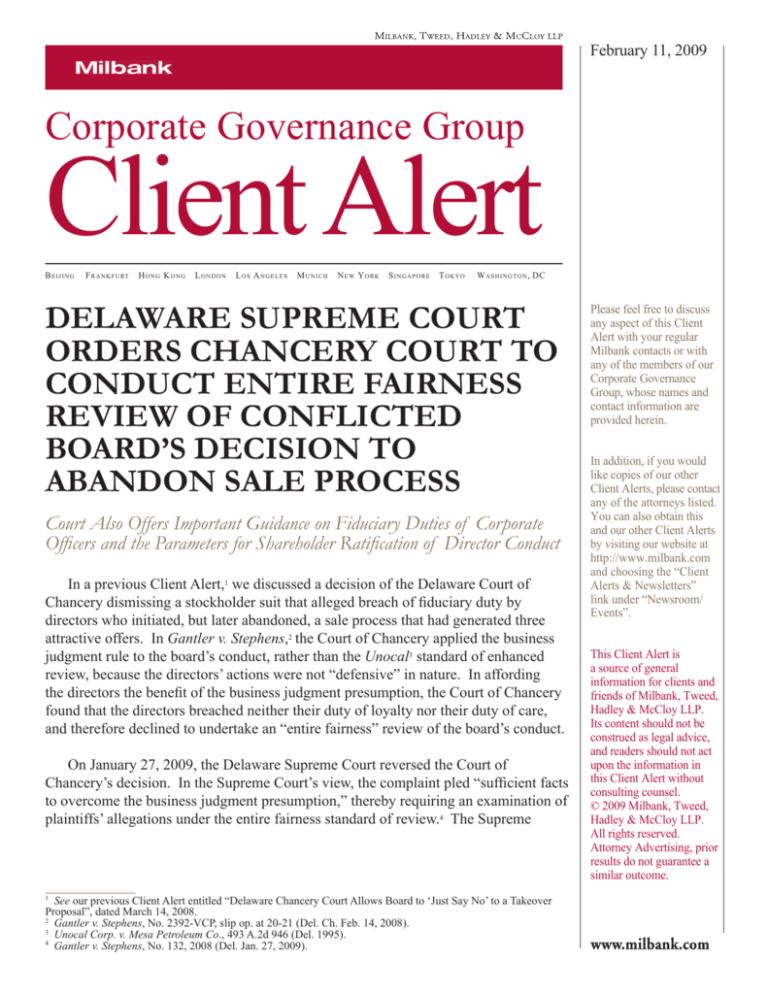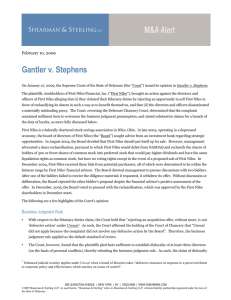
February 11, 2009
Corporate Governance Group
Client Alert
Beijing
F r a n k f u rt
Hong Kong
London
Los Angeles
Munich
New York
Singapore
Tokyo
W a s h i n g to n , DC
DELAWARE SUPREME COURT
ORDERS CHANCERY COURT TO
CONDUCT ENTIRE FAIRNESS
REVIEW OF CONFLICTED
BOARD’S DECISION TO
ABANDON SALE PROCESS
Court Also Offers Important Guidance on Fiduciary Duties of Corporate
Officers and the Parameters for Shareholder Ratification of Director Conduct
In a previous Client Alert,1 we discussed a decision of the Delaware Court of
Chancery dismissing a stockholder suit that alleged breach of fiduciary duty by
directors who initiated, but later abandoned, a sale process that had generated three
attractive offers. In Gantler v. Stephens,2 the Court of Chancery applied the business
judgment rule to the board’s conduct, rather than the Unocal3 standard of enhanced
review, because the directors’ actions were not “defensive” in nature. In affording
the directors the benefit of the business judgment presumption, the Court of Chancery
found that the directors breached neither their duty of loyalty nor their duty of care,
and therefore declined to undertake an “entire fairness” review of the board’s conduct.
On January 27, 2009, the Delaware Supreme Court reversed the Court of
Chancery’s decision. In the Supreme Court’s view, the complaint pled “sufficient facts
to overcome the business judgment presumption,” thereby requiring an examination of
plaintiffs’ allegations under the entire fairness standard of review.4 The Supreme
See our previous Client Alert entitled “Delaware Chancery Court Allows Board to ‘Just Say No’ to a Takeover
Proposal”, dated March 14, 2008.
2
Gantler v. Stephens, No. 2392-VCP, slip op. at 20-21 (Del. Ch. Feb. 14, 2008).
3
Unocal Corp. v. Mesa Petroleum Co., 493 A.2d 946 (Del. 1995).
4
Gantler v. Stephens, No. 132, 2008 (Del. Jan. 27, 2009).
1
Please feel free to discuss
any aspect of this Client
Alert with your regular
Milbank contacts or with
any of the members of our
Corporate Governance
Group, whose names and
contact information are
provided herein.
In addition, if you would
like copies of our other
Client Alerts, please contact
any of the attorneys listed.
You can also obtain this
and our other Client Alerts
by visiting our website at
http://www.milbank.com
and choosing the “Client
Alerts & Newsletters”
link under “Newsroom/
Events”.
This Client Alert is
a source of general
information for clients and
friends of Milbank, Tweed,
Hadley & McCloy LLP.
Its content should not be
construed as legal advice,
and readers should not act
upon the information in
this Client Alert without
consulting counsel.
© 2009 Milbank, Tweed,
Hadley & McCloy LLP.
All rights reserved.
Attorney Advertising, prior
results do not guarantee a
similar outcome.
Corporate Governance Group
Court’s analysis provides helpful insight into the nature of the pleading required to overcome the presumption
of the business judgment rule in the M&A context. The Gantler decision also clarifies the nature of the
fiduciary duties owed by corporate officers to a Delaware corporation, as well as the scope and application of
the shareholder ratification doctrine under Delaware law.
Background
In August 2004, the board of directors of First Niles Financial, Inc. authorized a process to sell the company,
and retained financial and legal advisors to assist. At the next board meeting, with the sale process underway,
management advocated abandoning the process in favor of a so-called “going private” transaction. The board
did not act on management’s proposal, but instead allowed the sale process to continue.
Eventually, the board received indications of interest from three bidders, two of whom stated that they
would terminate the incumbent directors upon consummation of the merger. The board decided to pursue two
of these bids, including one which did not take a position regarding retention of the directors. These two bids
offered premiums from 3.4% to 6.8% over the then-current First Niles share price, figures that the board’s
financial advisor opined were within an acceptable range.
The board authorized management to permit these two bidders to conduct due diligence. One of the
bidders withdrew its offer when management failed to comply with its due diligence requests. Management
also initially failed to provide the other bidder with requested due diligence materials, but relented after this
bidder also threatened to withdraw. Apparently satisfied with the results of its due diligence investigation, the
remaining bidder raised its offer twice and, again, the board’s financial advisor opined that the revised offers
were within an acceptable range. Nevertheless, without discussing the revised offers, the board rejected the bid
at a special meeting and abandoned the sale process.
Several weeks later, the board returned to discussing management’s plan to take First Niles private through
a reclassification of the shares of holders of 300 or fewer shares of common stock into a new series of nonvoting preferred stock. After an oral presentation on the contemplated privatization by outside counsel during
which no written materials were furnished, the board determined, presumably without the benefit of advice from
a financial advisor, that the reclassification plan was fair to all shareholders. The board then mailed a proxy
statement describing the reclassification to First Niles shareholders, who voted to approve the plan.
Plaintiff shareholders sued, alleging that, among other things, the directors and officers of First Niles
had breached their fiduciary duties to First Niles shareholders by rejecting the merger offer and abandoning
the sale process.5 In determining the applicable standard of review, the Court of Chancery held that Unocal
did not apply because the complaint did not allege any “defensive” action by the board. In addition, the Court
of Chancery found that an entire fairness review was inappropriate because, among other reasons, an “entire
fairness review would be inconsistent with the broad power allocated to directors.” Accordingly, the Court of
Plaintiffs also attacked the disclosures contained in the proxy statement describing the reclassification plan, as well as the board’s decision to move
ahead with the reclassification plan.
5
2
Corporate Governance Group
Chancery applied the business judgment rule and, on that basis, determined that the facts alleged did not rebut
the presumption that the directors had exercised adequate business judgment in abandoning the sale process.
Plaintiffs appealed this decision to the Delaware Supreme Court.
Directors’ Fiduciary Duty Claims
Supreme Court’s Analysis
First, the Supreme Court agreed with the Court of Chancery’s determination that enhanced scrutiny under
Unocal was not applicable to the board’s decision to abandon the sale process. Plaintiffs’ claim, according to
the Supreme Court, “sounds in disloyalty, not improper defensive conduct … [and] does not allege any hostile
takeover attempt or similar threatened external action from which it could reasonably be inferred that the
defendants acted ‘defensively’.”
On the other hand, the Supreme Court strongly disagreed with the Court of Chancery’s failure to apply
an entire fairness review to the directors’ conduct. In this regard, the Supreme Court noted that although
“[a] board’s decision not to pursue a merger opportunity is normally reviewed within the traditional business
judgment framework,” the facts alleged were sufficient to overcome this presumption and require a full judicial
review of whether the directors had satisfied their duty of loyalty.
In reaching this decision, the Supreme Court noted that a board’s motivation to retain corporate control in
the face of a bidder’s statement that incumbent directors would not be retained will not, alone, support a finding
that the directors acted disloyally. Rather, “the plaintiffs must plead, in addition to a motive to retain corporate
control, other facts sufficient to state a cognizable claim that the Director Defendants acted disloyally.”
In the Supreme Court’s view, the plaintiffs met this burden by pleading facts “sufficient to establish
disloyalty of at least three (i.e., a majority) of the remaining directors, which suffices to rebut the business
judgment presumption.” The Supreme Court highlighted several factors important to its analysis, including
that the reclassification proxy statement itself admitted that the directors had a conflict of interest because the
directors were in a position to structure the reclassification to benefit their interests “differently from the interest
of the unaffiliated stockholders.” The Court also conducted a director-specific analysis, finding that a majority
of the members of the board were conflicted for one reason or another. The disqualifying conflicts identified
by the Court included that (i) one bidder withdrew its offer when the Chairman and CEO never responded to
its due diligence request, which the Court deemed sufficient to demonstrate that the Chairman acted in his own
“personal financial interest, as opposed to the interests of the shareholders,” and (ii) two of the other directors
owned businesses that provided services to First Niles which would be in jeopardy if a takeover was completed.
Accordingly, the Supreme Court reversed the Court of Chancery’s decision and remanded the case for an
entire fairness review of the board’s conduct.
3
Corporate Governance Group
Conclusion
The primary, and unsurprising, message of Gantler is that in making a decision not to pursue a potential
change of control transaction, a board of directors must undertake the same careful and deliberative process
it would apply in determining to pursue such a transaction. Step one of such a process would be an open
discussion among the directors as to any interests that any of them might have with respect to a decision not
to pursue a transaction. A board should also retain and heed the advice of expert financial and legal advisors,
carefully document its proceedings, manage its conflicts and focus on the role that truly independent directors
play in the decision-making process. If, as in Gantler, board members are perceived to have personal interests
that could influence their decisions, or if the board does not carry out its decision-making process in a manner
appropriate for the relative importance or complexity of the matter at hand, then a court may very well
determine that the business judgment presumption has been rebutted and, as a result, the actions of the directors
will be analyzed under the much more exacting and intrusive entire fairness standard of review.
It is also important to note that the Supreme Court’s decision to subject the First Niles board’s conduct
to an entire fairness review – instead of affording the directors the protection of the business judgment rule –
does not alter the ability of a board to “just say no” to a takeover proposal (even one generated by a sale process
initiated by a board) if the board determines that acceptance of the offer would not be in the best interest of the
company. This is implicit in the Supreme Court’s decision not to subject the First Niles board’s actions to an
enhanced level of scrutiny under Unocal. Of course, the result will be different when a board adopts defensive
measures in the face of a hostile bid.
Nor does Gantler indicate that boards have less protection when making a business judgment relating
to a potential change in control transaction as compared to other circumstances. In fact, the Supreme Court
specifically stated that normally a “board’s decision not to pursue a merger opportunity is … reviewed within
the traditional business judgment framework. In that context the board is entitled to a strong presumption in
its favor because implicit in the board’s statutory authority to propose a merger, is also the power to decline to
do so.” Unfortunately for the First Niles directors, the facts pled, in the Supreme Court’s view, rebutted that
presumption.
Other Notable Holdings of the Court
The Gantler decision also provides clarification of two previously unclear aspects of Delaware
corporation law.
Fiduciary Duties of Officers
In Gantler, the Delaware Supreme Court, for the first time, explicitly ruled that officers of Delaware
corporations owe the same fiduciary duties of care and loyalty to their corporations as those owed by directors
of Delaware corporations.6 Applying the same standards of loyalty and care to First Niles’ officers as it did to
In In re Walt Disney Co., Deriv. Litig., 2004 WL 2050138, Chancellor Chandler noted that “To date, the fiduciary duties of officers have been
assumed to be identical to those of directors.” Of course, corporate officers, unlike corporate directors, do not benefit section 102(b)(7) of the
Delaware General Corporation Law, which allows corporations to include a provision in their Certificates of Incorporation exculpating their directors
from personal liability for breach of their duty of care.
6
4
Corporate Governance Group
its directors, the Court found that two of First Niles’ officers breached their fiduciary duty of loyalty by, among
other things, failing to respond adequately to the bidders’ due diligence requests.
In light of this ruling, it is appropriate, to the extent that they have not done so already, for Delaware
corporations to be sure that their officers receive the same education with respect to their duties of loyalty and
care under Delaware law as it has become customary for their directors to receive.
Shareholder Ratification Doctrine
The Delaware Supreme Court also took the opportunity in Gantler to clarify, and in fact narrow, the doctrine
of shareholder ratification of director conduct “[to] restore coherence and clarity to this area of our law.” First,
the Court limited this doctrine to its “classic” form, under which a “fully informed shareholder vote” can only
ratify “director action that does not legally require shareholder approval in order to become legally effective.”
Moreover, the Court declared that a ratification vote is only effective to “subject the challenge to director action
to business judgment review, as opposed to ‘extinguishing’ the claim all together … [by] obviating all judicial
review of the challenged action … “
Applying this standard to the facts presented in Gantler, the Court ruled that the ratification doctrine did
not apply to the First Niles shareholder vote on the reclassification plan because that plan, insofar as it involved
an amendment to the company’s Certificate of Incorporation, was required by statute to be approved by
shareholders. In addition, the Court noted that, even if ratification was available, plaintiffs’ “complaint states a
cognizable claim that the Reclassification Proxy was materially misleading,” thereby eliminating “an essential
predicate for applying the doctrine, namely, that the shareholder vote was fully informed”, and therefore
effective to ratify the conflict at issue.
5
Corporate Governance Group
Please feel free to discuss any aspect of this Client Alert with your regular Milbank contacts or with any of the members of our
Corporate Governance Group, whose names and contact information are provided below.
Beijing
Units 05-06, 15th Floor, Tower 2
China Central Place, 79 Jianguo Road, Chaoyang District
Beijing 100025, China
Anthony Root
+86-10-5969-2777
aroot@milbank.com
Edward Sun
+86-10-5969-2772
esun@milbank.com
Frankfurt
Taunusanlage 15
60325 Frankfurt am Main, Germany
Norbert Rieger
+49-69-71914-3453
Hong Kong
3007 Alexandra House, 18 Chater Road
Central, Hong Kong
Anthony Root
+852-2971-4842
Joshua Zimmerman +852-2971-4811
London
10 Gresham Street
London EC2V 7JD, England
Stuart Harray
+44-20-7615-3083
Thomas Siebens
+44-20-7615-3034
nrieger@milbank.com
aroot@milbank.com
jzimmerman@milbank.com
sharray@milbank.com
tsiebens@milbank.com
Los Angeles
601 South Figueroa Street
Los Angeles, CA 90017
Ken Baronsky
+1-213-892-4333
Neil Wertlieb
+1-213-892-4410
kbaronsky@milbank.com
nwertlieb@milbank.com
Munich
Maximilianstrasse 15 (Maximilianhoefe)
80539 Munich, Germany
Peter Nussbaum
+49-89-25559-3636
pnussbaum@milbank.com
New York
One Chase Manhattan Plaza
New York, NY 10005
Scott Edelman
+1-212-530-5149
Roland Hlawaty
+1-212-530-5735
Thomas Janson
+1-212-530-5921
Robert Reder
+1-212-530-5680
Alan Stone
+1-212-530-5285
Douglas Tanner
+1-212-530-5505
sedelman@milbank.com
rhlawaty@milbank.com
tjanson@milbank.com
rreder@milbank.com
astone@milbank.com
dtanner@milbank.com
Singapore
30 Raffles Place, #14-00 Chevron House
Singapore 048622
David Zemans
+65-6428-2555 Naomi Ishikawa
+65-6428-2525 dzemans@milbank.com
nishikawa@milbank.com
Tokyo
21F Midtown Tower, 9-7-1 Akasaka, Minato-ku
Tokyo 107-6221 Japan
Darrel Holstein
+813-5410-2841
dholstein@milbank.com
Bradley Edmister +813-5410-2843
edmister@milbank.com
Washington, DC
International Square Building, 1850 K Street
Washington, DC 20006
Glenn Gerstell
+202-835-7585
gerstell@milbank.com
6










